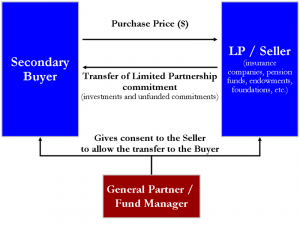Liquidity in the private equity market Saturday, Dec 27 2008
Definition 9:24 am
Diagram of a simple secondary market transfer of a limited partnership fund interest. The buyer exchanges a single cash payment to the seller for both the investments in the fund plus any unfunded commitments to the fund.
The private equity secondary market (also often called private equity secondaries) refers to the buying and selling of pre-existing investor commitments to private equity and other alternative investment funds. Sellers of private equity investments sell not only the investments in the fund but also their remaining unfunded commitments to the funds. By its nature, the private equity asset class is illiquid, intended to be a long-term investment for buy-and-hold investors. For the vast majority of private equity investments, there is no listed public market; however, there is a robust and maturing secondary market available for sellers of private equity assets.
Increasingly, secondaries are considered a distinct asset class with a cash flow profile that is not correlated with other private equity investments. As a result, investors are allocating capital to secondary investments to diversify their private equity programs. Driven by strong demand for private equity exposure, a significant amount of capital has been committed to secondary investments from investors looking to increase and diversify their private equity exposure.
Investors seeking access to private equity have been restricted to investments with structural impediments such as long lock-up periods, lack of transparency, unlimited leverage, concentrated holdings of illiquid securities and high investment minimums.
Secondary transactions can be generally split into two basic categories:
* Sale of Limited Partnership Interests – The most common secondary transaction, this category includes the sale of an investor’s interest in a private equity fund or portfolio of interests in various funds through the transfer of the investor’s limited partnership interest in the fund(s). Nearly all types of private equity funds (e.g., including buyout, growth equity, venture capital, mezzanine, distressed and real estate) can be sold in the secondary market. The transfer of the limited partnership interest typically will allow the investor to receive some liquidity for the funded investments as well as a release from any remaining unfunded obligations to the fund.
* Sale of Direct Interests – Secondary Directs or Synthetic secondaries, this category refers to the sale of portfolios of direct investments in operating companies, rather than limited partnership interests in investment funds. These portfolios historically have originated from either corporate development programs or large financial institutions.
